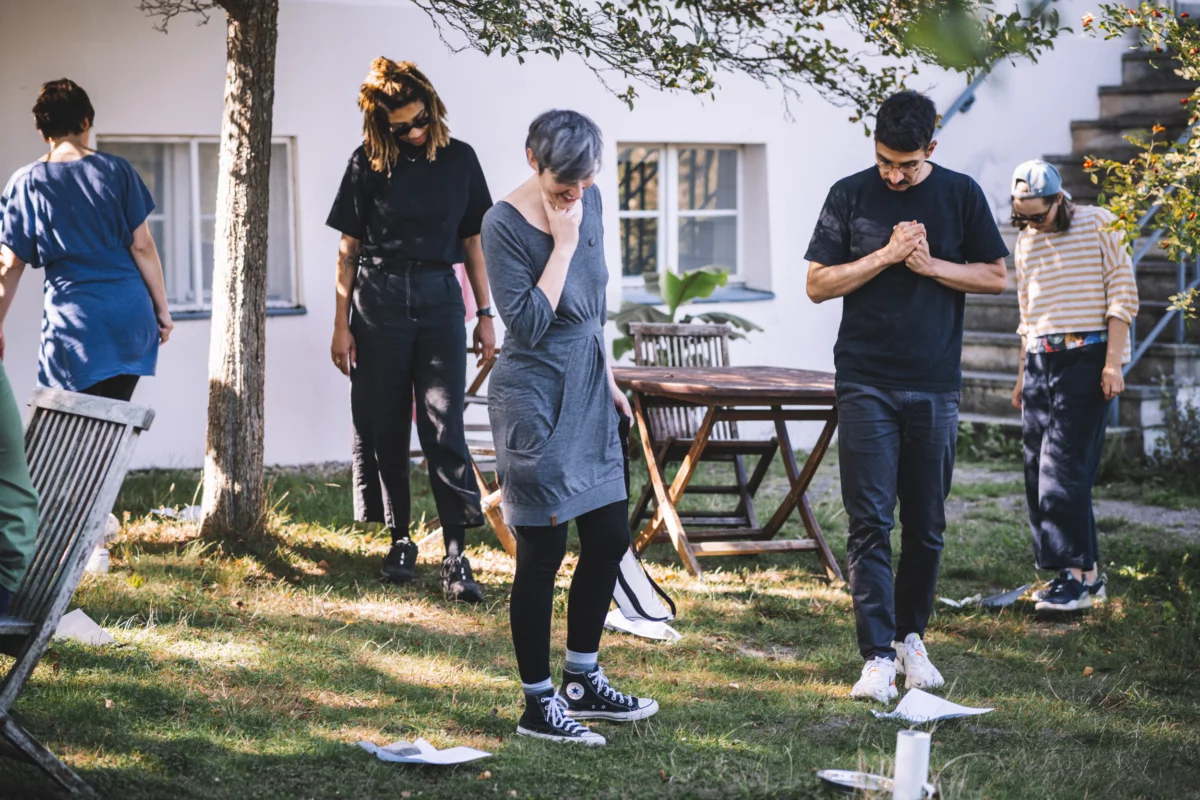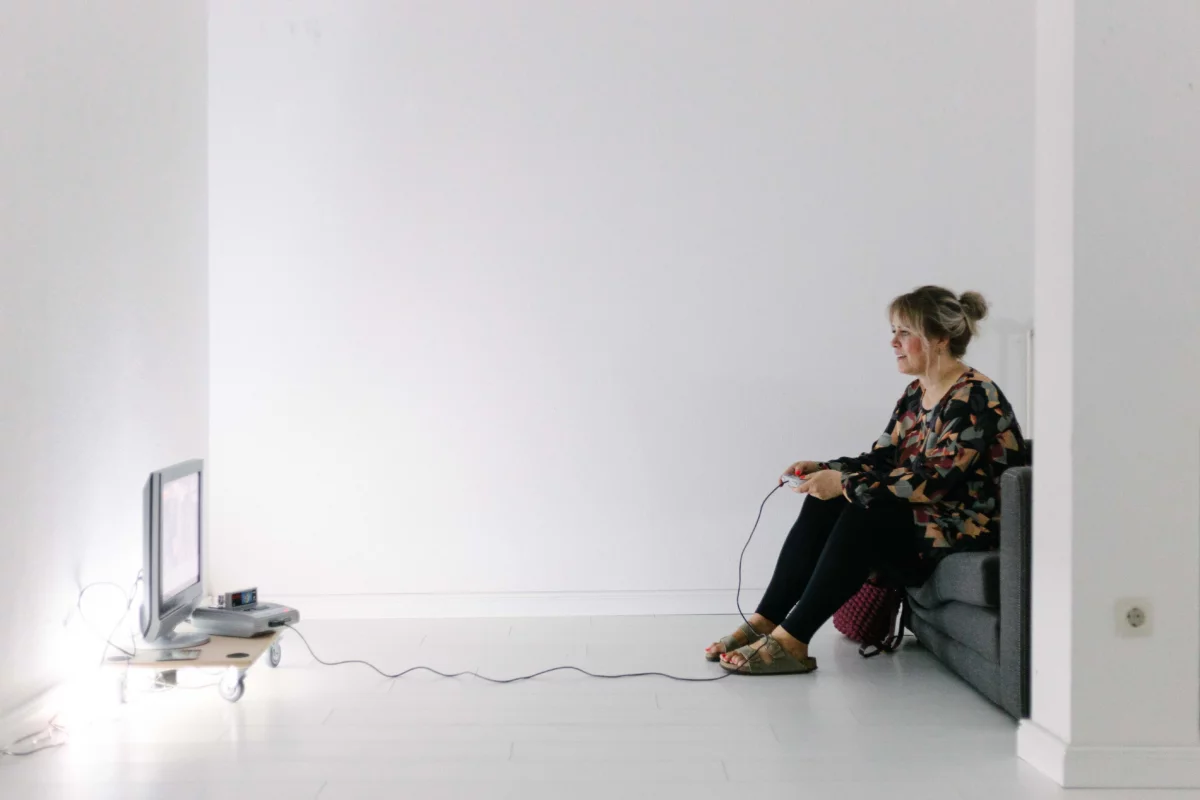User? Experience! – Post-digital experiments in the post-pandemic era
By Yasmine Salimi
Our author Yasmine Salimi finds out how the post-digital senses can be sharpened in performance spaces in conversation with the initiators of labs that focus on augmented realities and advertising on TikTok.
Ever since physical encounters were possible again, the digital theater has been having a hard time. In a post-digital society, the binary separation between the analog and the digital has long since become obsolete, as the two areas are already constantly merging. Instead of lamenting the fate of the digital theater, it would therefore be better to ask what we can learn about dealing with audiences from digital modes of interaction. Or what it takes to implement performative, participatory processes in tune with the post-digital society – and without process- and research-oriented funding, which is currently on the wane.
Three of the Artist Labs made possible by the Fonds Darstellende Künste in the summer of 2023 addressed performative and digital processes and dealt with these and similar questions. What they have in common is a demand-oriented approach that relates to different audiences. In other words, to the „People Formally Known As The Audience“ (Jay Rosen), for whom new terms have emerged in the independent scene – users, users, accomplices, players.
The Artist Lab "Shifting Communities" focused on an audience whose members were understood as participants and test players. The aim was to connect 17 cross-regional artists at the interface of the performative and digital arts and to invite them to exchange ideas about participatory production methods. Susanne Schuster, the independent dramaturge, curator and co-initiator of the Artist Lab, sees a discrepancy between existing theater structures and the requirements of a more gaming-oriented concept of performance, in which the audience is not only present at the premiere, but also beforehand – for example, to try out software or game design and provide feedback about their user experience. "One realization was that we would prefer to do away with premieres in order to develop a production process where the audience can be continuously involved," says Susanne Schuster. The Artist Lab deepened and expanded the complicity that had already been established as part of the BREAKDOWN series by her group OutOfTheBox.
 © Anna-Kristina Bauer
© Anna-Kristina Bauer
In the Artist Lab “Bits and Bytes,” which had just started at the time of writing, the concept of the audience is conceived in the broadest possible sense and basically refers to urban society. The pop-up lab is in a vacant space in Lüneburg's city center that invites interested citizens to train their own digital fitness at stations dedicated to virtual reality, augmented reality, artificial intelligence, online security, coding and gaming – and, at best, to experience themselves as a learning community. "The exciting thing is that people won't even realize at first that they are an audience, but they will go into a store where they will be introduced to art for free," says Marion Kleine-Onnebrink, who has helped design the Artist Lab in her role as an open space planner, scenographer and city maker.
The idea came about when theater director and game designer Laura Tontsch returned to Lüneburg, where she had gone to high school. She asked herself: "What can I give this city, what does the city need? There are a lot of empty buildings, what can I do?" As a narrative designer for virtual and augmented reality, she wanted to create a place where fears of digital technologies could be overcome in a playful way. Her idea was that this could also create new approaches to artistic formats that work with these technologies. In the best-case scenario, it would be possible to learn from each other, for example if the Hamburg Retro-Spiele-Club (Retro games club) brought along a Commodore 64 and thus availed of the video game expertise of older generations.
 © Joshua Delissen
© Joshua Delissen
The Artist Lab “Auswege aus patriarchaler Männlichkeit – eine Zielgruppenforschung” "Ways out of patriarchal masculinity – a target group research," on the other hand, is interested in an audience in the sense of the sub-groups made up of users of social media such as TikTok and Instagram. According to Caspar Weimann, post-digital theater maker and professor of acting, who initiated the Artist Lab and also mentors other Artist Labs on the subject of digitality, experience has shown that addressing "everyone" doesn’t work in this context. The lab is designed as a multi-stage process involving experts in the critique of masculinity and the analysis of far-right radicalization.
The aim is to conduct basic research into the potential of advertising on Instagram and TikTok to counter toxic masculinity discourses by using alternative images and narratives of masculinity. Caspar Weimann's collective onlinetheater.live has already designed an app, "Loulu," which detects anti-feminist strategies on the internet and is now also being used in the classroom. In addition, the aim now is to intervene in the dynamics that actors such as "Hustlers University" use on social media to attract young men into spirals of violence and loneliness and make them susceptible to far-right discourse. A key challenge is overcoming one's own bubble, "bubble bursting": "Reaching other people in other bubbles and working there in an interventionist way is almost impossible, except through the very attractive tool of advertising – understood as paid reach on social media," says Weimann. "We are interested in how we can specify more precisely how to reach which people who like which hashtags or which content." Various prototypes for possible artistic interventions will be developed during the Artist Lab.
In all three labs, the strategies are very design-oriented: Prototyping, game design, play tests, design thinking and user experience design being deployed against patriarchy, for community building and playful learning. Apart from the fact that processes and changes are addressed and the boundaries between analog and digital spaces and public spheres are broken down, the participants attach importance to various aspects of the theatrical. For Laura Tontsch, the element of narration in theater and games is particularly relevant, while Marion Kleine-Onnebrink is interested in the aspect of immersion. And Susanne Schuster emphasizes that the sharing of knowledge in the "open source" mode should not be confused with what emerges from it: Artistic expression remains subjective and unique. Caspar Weimann emphasizes the element of curating the self as a character: "The greatest theater of our reality is actually the social internet, which completely shapes our society, where people play characters."
The various formats that tie in with these digital realities are ultimately not just about meeting the needs of users. They are also about creating a special experience that sharpens our post-digital senses.
In the summer of 2023, in 64 Bundesweiten Artist Labs, independent artist groups explored the relationship with the audience in post-pandemic times. Our editor Elisabeth Wellershaus and a team of guest authors observed them at work.
Yasmine Salimi is a dramaturge and translator, she researches, writes, curates and in doing so always has something to do with theater. She is part of the Berlin puppet theater collective Manufaktor, works for the international festival for contemporary puppet and object theater, Theater der Dinge, at the Schaubude Berlin and translates plays from French into German.